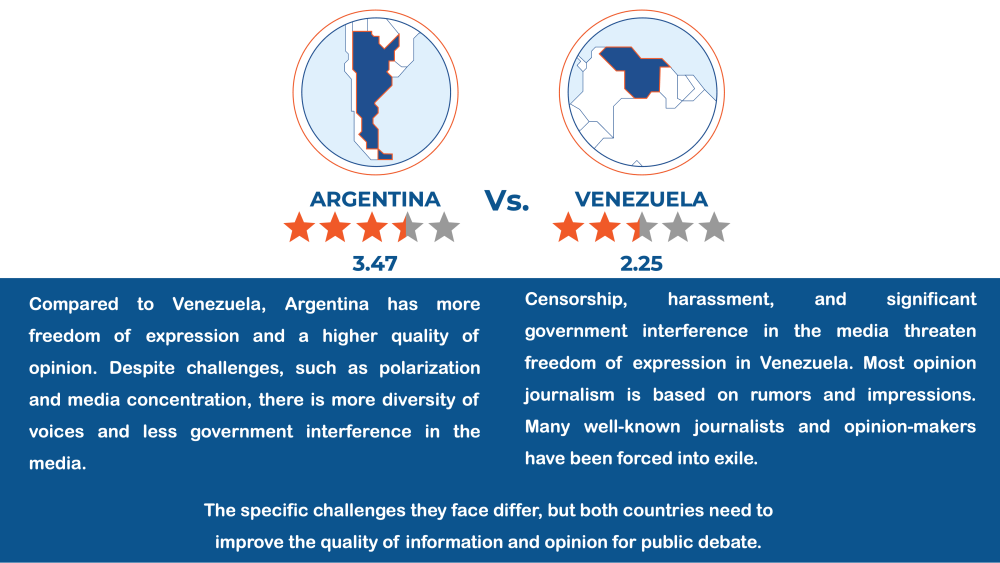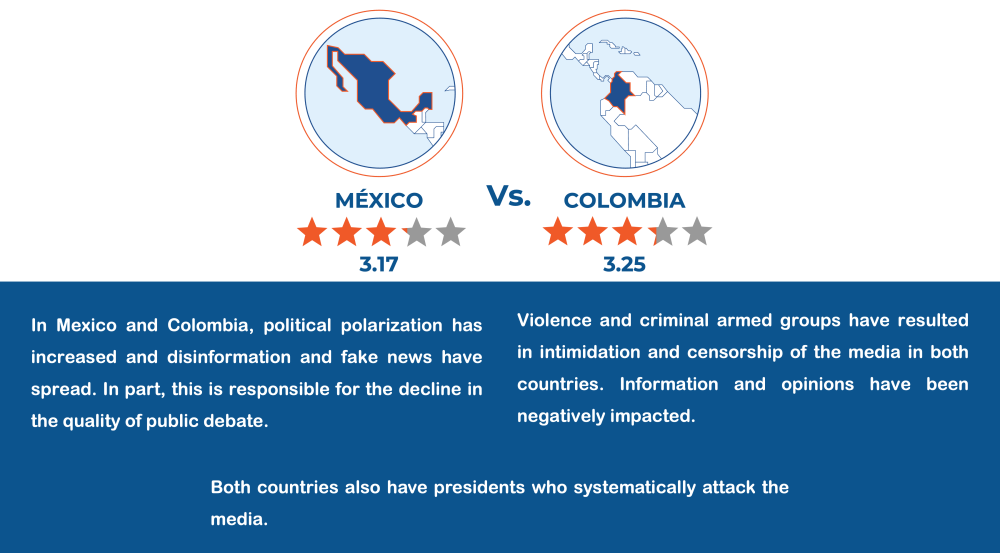
A blog of the Latin America Program
In the last two decades, Latin American journalism has experienced a boom in new media. According to the latest census by SembraMedia, an organization dedicated to promoting independent digital journalism in the Americas and Spain, Latin America is home to nearly 1,000 native digital media outlets.
Many of these outlets have adopted best practices in fact-checking, citations, diversity and inclusion. This vibrant landscape is proof that independent news media outlets have overcome challenges that beset many historical media organizations in the region, including declining advertising revenue and audience fragmentation.
By contrast, opinion journalism seems stuck in the 20th century. The gap between these two essential forms of journalism continues to widen. For instance, no regional media outlets in Latin America focus on opinion. Why might this be? To examine this question, I conducted a study, “The State of Opinion Journalism in Latin America,” analyzing 208 media outlets and 554 articles from 12 countries. I concluded that Latin American opinion journalism faces profound challenges with regards to editing and editorial vision.
There are several reasons for this. For one, collaboration between editors and opinion authors is not common, as most authors defend their articles as if they were sacred and untouchable. As the late novelist Carlos Fuentes observed, “If you were to try to edit anyone’s text in Latin America, even a hack, he would resign immediately, accusing you of censoring or insulting him.” This emotional and absurd tradition hinders collaboration and limits the quality of opinion content, which to be effective, should share an original viewpoint, with an argument supported by reasoning, evidence and verifiable data. To revamp opinion and bring it into the 21st century, we must discard this approach.
Different Latin American countries face different challenges in strengthening opinion journalism. In Argentina, a country with a long tradition of political opinion journalism, opinion is characterized by dependent relationships between authors and insiders. Media expert Adriana Amado argues that polarization restricts access to sources. As a result, opinion writers generally advance the agendas of those in power. Moreover, though Reporters Without Borders ranks Argentina second in Latin America regarding press freedom, that freedom has not led to diverse opinion writing. A majority of Argentine digital media outlets focus their opinion sections on politics and economics, with only a few addressing technologies, lifestyle, gender and culture.

It is also concerning that opinion authors are disproportionately male, including in Argentina, where men write nearly 80 percent of opinion pieces. This raises concerns about coverage of topics relevant to women, such as sexual violence, job opportunities and reproductive rights.
At the other end of the spectrum is Venezuela, ranked lowest in the region for press freedom. A brutally repressive government and the country’s economic collapse have devastated a once-vibrant media sector. Access to verifiable information is limited and censorship is common. When it comes to topics of public interest, expressing opinions with solid and well-founded arguments is nearly impossible.
Mexico has a diverse media landscape with solid opinion writing, but opinion content tends to be of inconsistent quality and conventional in its presentation. The opinion sections of major media outlets lack a distinct editorial line separate from the news coverage. Furthermore, President Manuel Andrés López Obrador continuously targets the news media, including opinion columnists, in his daily television show, “La Mañanera,” punishing critics. Mexico is also the most dangerous country in the region for journalists, with 13 killed in 2022. That violence also contributes to self-censorship.

There is a diverse range of digital media outlets in Colombia, including well-established organizations and newcomers that have made remarkable strides, such as La Silla Vacía and Cuestión Pública. However, opinion journalism is not always up to par with longstanding and innovative newsgathering. While traditional media organizations like El Espectador, Semana and El Tiempo – and more recent ones like Cambio – employ columnists, few have a significant impact in the public debate. As media critic Omar Rincón pointed out, “Opinion journalism in Colombia is about expressing opinions without journalism; all opinion writers want is to show how clever they are and celebrate being ‘chosen’ to enlighten the ignorant.”
To develop opinion journalism in Latin America, media organizations need opinion sections with skilled and innovative editors willing to recruit knowledgeable and experienced authors and collaborate to sharpen their ideas and strengthen their arguments and writing. They should also experiment with digital tools to improve content quality and reader engagement and adopt best practices in editing, fact-checking and social media use.
Given the enormous political, economic and social challenges in Latin America, opinion journalism should play a crucial role in instigating and informing public debates. Fortunately, the region has plenty of expertise, and dynamic and professional opinion content would no doubt find a large audience.
Author

Independent journalist and editor

Latin America Program
The Wilson Center’s prestigious Latin America Program provides non-partisan expertise to a broad community of decision makers in the United States and Latin America on critical policy issues facing the Hemisphere. The Program provides insightful and actionable research for policymakers, private sector leaders, journalists, and public intellectuals in the United States and Latin America. To bridge the gap between scholarship and policy action, it fosters new inquiry, sponsors high-level public and private meetings among multiple stakeholders, and explores policy options to improve outcomes for citizens throughout the Americas. Drawing on the Wilson Center’s strength as the nation’s key non-partisan policy forum, the Program serves as a trusted source of analysis and a vital point of contact between the worlds of scholarship and action. Read more

Explore More in Weekly Asado
Browse Weekly Asado
Dengue Haunts South America’s Summers

Lessons from Costa Rica’s Economic Transformation

Women and Latin America’s Digital Revolution

